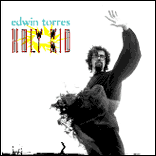 |
|
| lingo | |
| e-vents | |
| books | |
| sound | |
| about | |
| lobes | |
| contact | |
|
|
|
|
||||||||||||||||||||||||||||||||||||||||||||||||||||||||||||||||||||||||||||||||||||||||||||||||||||||||||||||||||||||||||||||||||||||||||||||||
 |
[ 1 ] [ 2 ] [ 3 ] [ 4 ] [ 5 ]
Holy Kid Kill Rock Stars, KRS 293, Produced by Edwin Torres, Jordan Trachtenberg Engineered at RetroMedia Studios, Red Bank, NJ
review by K. Goldsmith/NY Press, V11, N21 Edwin Torres's new record Holy Kid is an heir to that moment and might be the most synthetic record I've come across in a long time. Torres bring together an astonishing number of styles and concerns and fuses them into a playful unified statement. In a time when musicians are seeking ever narrower turf for marketing purposes, Torres is moving in the opposite direction casting as a wide a net as possible. It's an inspiring stance and the good news is that he actually pulls it off. Holy Kid is a very gentle record consisting of loopy samples, acoustic guitars, tropical rhythms, theremins, hand saws, pebble percussion, choirs and jazz beats. There's a spaced-out feeling to the whole affair due to Torres's lilting sing-song voice. It's a record that takes its own sweet time; it's a moment of peace and introspection created in the midst of urban frenzy. It could be a great children's record in that its sounds are just as important as what's being said. And then there's a whole cartoony aspect to the disc: Torres dons an army of voices that are slightly stretched, warped and twisted to subtle comic effect. It's hard to believe that they all come from the same person. While most of the disc is studio produced one track, "Pastoral Watusi," is a wonderful live duet with drummer Sean G. Meehan. Stripped of all studio tricks, it's just voice and a small drum kit and it's here that Torres's talent really comes through. In this five minute chant, Torres falls into a an acoustic trance spinning short sentences with a semi-narrative that relies more on formal poetic meter than rap influence. The spartan drumming invokes smoky Lenny Bruce-era strip joints alongside Torres's Lord-Buckley-on-tranquilizers rant. It's everything you always fantasized that the legacy of Beat performance poetry would be. Holy Kid straddles a position somewhere between Finnegans Wake and I Love Lucy. It's Gertrude Stein drunk on tequila. It's Jerry Lewis reciting the Ursonate. It's William Carlos Williams fronting a psychedelic band at the Fillmore East. It's Q-Tip as King Lear. It reconciles the diametrically opposed poetic agendas of the Nuyorican Cafe and Language Poetry, creating a type of sound poetry sure to interest both groups. By ripping through convention and style, Torres creates something so new that Holy Kid is sure to embarrass small minds still clinging to minute agendas.
[ top ]
|



